Reviews
What Lola Wants
George Abbott and Stanley Donen
USA, 1958
Credits
Review by Matt Bailey
Posted on 14 January 2005
Source Warner Bros. DVD
In the late 1950s, the movie musical fell on hard times. The decade began with the genre at its incontestable peak: lavish, extravagant films like Showboat, An American in Paris, and Singin’ in the Rain were the order of the day. As the years progressed, however, movie musicals continued to be made but delivered diminishing returns. Whereas the start of the decade offered back-to-back productions by MGM’s legendary Arthur Freed crammed with astonishing song-and-dance numbers, the end and the start of the next put forward nothing but dull, widescreen vistas of obvious soundstages where singers flown in from Broadway (or worse—Hollywood actors who couldn’t sing) stood around and declaimed on love and marriage in adequate but unmemorable song. With hoofing and tapping somehow hopelessly out of fashion, the movie musical became staid and unexciting: the poor man’s punishment for not being able to see the original Broadway show.
After a couple of embarrassing flops and the death of Arthur Freed, MGM all but gave up on the musical, making fewer in the entirety of the 1960s than in the year 1955 alone. Fox soldiered on with the Broadway-on-film aesthetic and even struck gold a few times with films like The King and I and The Sound of Music. Warner Brothers fared far less well, but did manage to adapt two Broadway musicals to the screen with modest commercial and artistic success. Those two, both co-directed by writer George Abbott and MGM defector Stanley Donen, were The Pajama Game and Damn Yankees.
Both films imported a large number of the original Broadway casts of both shows, replacing key leads with established Hollywood actors. Doris Day took over from Janis Paige in The Pajama Game, and Tab Hunter took over from Stephen Douglass in Damn Yankees. The most fortunate holdovers from Broadway, at least for the latter picture, were Ray Walston, Gwen Verdon, and her husband, the choreographer Bob Fosse. Each contributes something to the film that would be difficult to imagine it being any good without, but the transition to Hollywood added something else.
While watching Damn Yankees offers many pleasures—the rare opportunity to see Bob Fosse and Gwen Verdon sing and dance together, the sublimely sharp and slimy performance of Ray Walston as the devil, the dulcet tones of Jean Stapleton’s singing voice, the definitive deliveries of several now classic songs such as “Heart” and “Whatever Lola Wants”—none compare to the spectacle of Tab Hunter in the prime of his beauty. No longer in the full, unblemished flower of his youth as he was in his early war and Western genre roles, but yet not as stiff and green as he was in them either, Hunter in Damn Yankees is relaxed and unguarded, allowing his brilliant smile to flash at moments that seem almost spontaneous. No longer trying to be an actor, but merely acting, Hunter becomes more than the blond, tanned, strapping matinee idol he was known as. At ease in his role as an American baseball hero from Nowheresville, Hunter’s plastic good looks become part of the character instead of the unlikely handicap of the Marine at war or the wayward cowboy gunslinger. This is not to say that Hunter—a throwback to a kind of Hollywood acting and image swiftly and handily rendered anachronistic by his contemporaries James Dean, Marlon Brando, and Montgomery Clift—is a great actor. He just happened to be impossibly (long-lashed, square-jawed, perfect-toothed) pretty while being wholly unperturbed by it, unlike others of his ilk including George Hamilton, Troy Donahue, and Fabian.
If I am in the mood for a musical, I will watch anything from MGM’s classic period (even a relative dud like Les Girls) when the movies trumped the theatre before I will watch the uninspired, stage-bound Fox or Warner Brothers versions of more famous Broadway productions. However, the charisma of Gwen Verdon, the innovation of Bob Fosse, and the exquisiteness of Tab Hunter are not to be dismissed lightly, so I will keep a copy of Damn Yankees around.
We don’t do comments anymore, but you may contact us here or find us on Twitter or Facebook.



